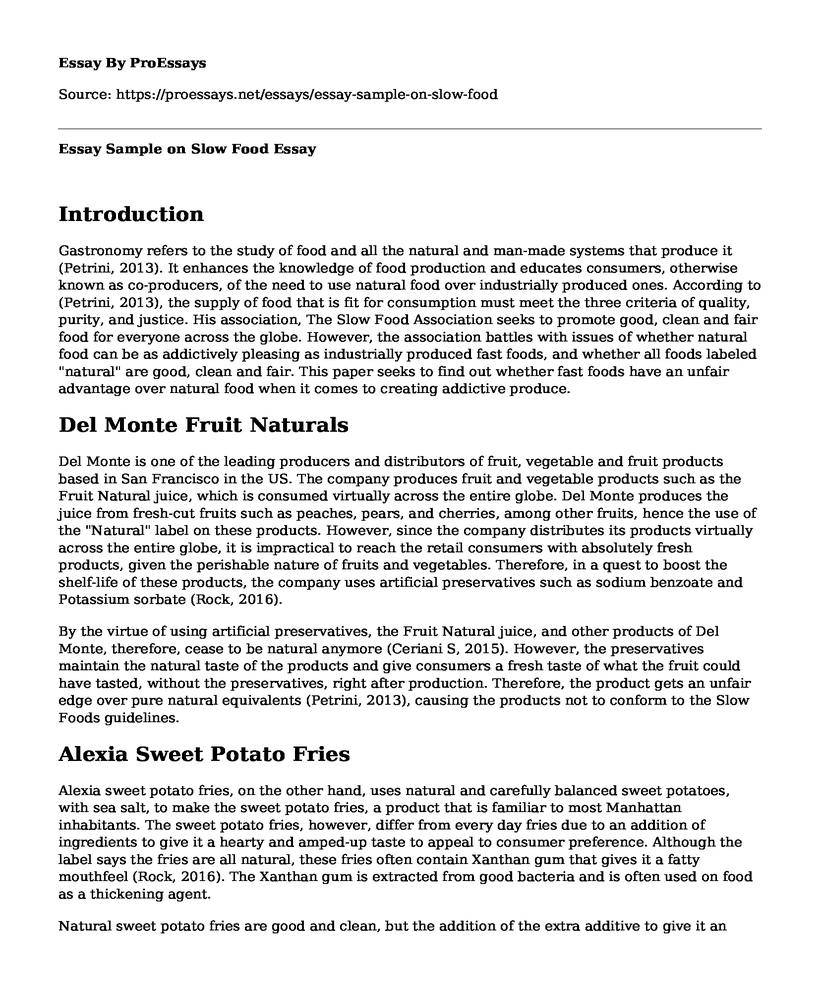Introduction
Gastronomy refers to the study of food and all the natural and man-made systems that produce it (Petrini, 2013). It enhances the knowledge of food production and educates consumers, otherwise known as co-producers, of the need to use natural food over industrially produced ones. According to (Petrini, 2013), the supply of food that is fit for consumption must meet the three criteria of quality, purity, and justice. His association, The Slow Food Association seeks to promote good, clean and fair food for everyone across the globe. However, the association battles with issues of whether natural food can be as addictively pleasing as industrially produced fast foods, and whether all foods labeled "natural" are good, clean and fair. This paper seeks to find out whether fast foods have an unfair advantage over natural food when it comes to creating addictive produce.
Del Monte Fruit Naturals
Del Monte is one of the leading producers and distributors of fruit, vegetable and fruit products based in San Francisco in the US. The company produces fruit and vegetable products such as the Fruit Natural juice, which is consumed virtually across the entire globe. Del Monte produces the juice from fresh-cut fruits such as peaches, pears, and cherries, among other fruits, hence the use of the "Natural" label on these products. However, since the company distributes its products virtually across the entire globe, it is impractical to reach the retail consumers with absolutely fresh products, given the perishable nature of fruits and vegetables. Therefore, in a quest to boost the shelf-life of these products, the company uses artificial preservatives such as sodium benzoate and Potassium sorbate (Rock, 2016).
By the virtue of using artificial preservatives, the Fruit Natural juice, and other products of Del Monte, therefore, cease to be natural anymore (Ceriani S, 2015). However, the preservatives maintain the natural taste of the products and give consumers a fresh taste of what the fruit could have tasted, without the preservatives, right after production. Therefore, the product gets an unfair edge over pure natural equivalents (Petrini, 2013), causing the products not to conform to the Slow Foods guidelines.
Alexia Sweet Potato Fries
Alexia sweet potato fries, on the other hand, uses natural and carefully balanced sweet potatoes, with sea salt, to make the sweet potato fries, a product that is familiar to most Manhattan inhabitants. The sweet potato fries, however, differ from every day fries due to an addition of ingredients to give it a hearty and amped-up taste to appeal to consumer preference. Although the label says the fries are all natural, these fries often contain Xanthan gum that gives it a fatty mouthfeel (Rock, 2016). The Xanthan gum is extracted from good bacteria and is often used on food as a thickening agent.
Natural sweet potato fries are good and clean, but the addition of the extra additive to give it an edge over normal fries gives it an unfair preference from consumers over normal fries (Ceriani S, 2015). Therefore, the Alexia sweet potato fries do not conform to the slow food standards.
Krakus Polish Sliced Ham
Krakus is a leading Polish distributor of ham in the UK and North America. Krakus cures its ham with natural products such as honey and natural salt. On the labels, it is stated that the ham comes with natural juices. However, apart from the ham, water, and salt, the company adds five more artificial chemicals to cure and preserve the ham (Rock, 2016). The aim of the preservatives remains to increase the shelf-life of the product to allow for exportation to other consumer countries.
Since the industry uses artificial ingredients to preserve the ham, it ceases to be natural as the label suggests (Rock, 2016). Unfortunately, the artificial preservatives give the company an edge to unfairly make the products addictive and tasty compared to natural ham (Ceriani S, 2015). Therefore, the ham does not meet the slow foods standard of good, clean and fair.
Conclusion
With the wake of globalization, making it possible for food products to be distributed across the globe, most, if not all food production companies often add chemical preservatives to increase the shelf life of their products. The demand for high production of artificially tweaked food products has led to the abandonment of slow foods, which are more nutritious and healthier than the fast foods (Ceriani S, 2015). As a result, with additional additives, artificially produced fast food products have become tastier than their natural equivalents. Unfortunately, according to (Ceriani S, 2015) the food packed as natural often leads to lifestyle diseases like type 2 diabetes and cardiovascular diseases. Therefore, learning to read food labels can inform consumers into making better choices (Ceriani S, 2015).
References
Ceriani S, S. M. (2015). Slow Food and The Planet. La Stamperia.
Petrini, C. (2013). Slow Food Nation: Why our food should be good, clean and fair. Rizzoli Publications.
Rock, A. (2016). Peeling back the 'natural' food label. Consumer Reports.
Cite this page
Essay Sample on Slow Food. (2022, Jul 11). Retrieved from https://proessays.net/essays/essay-sample-on-slow-food
If you are the original author of this essay and no longer wish to have it published on the ProEssays website, please click below to request its removal:
- Research Paper on Dietary Practices
- Pasteurized and Homogenized Milk Essay Example
- Starbucks Macroeconomic Analysis: Supply, Demand, Elasticity & More - Research Paper
- Turning Food Waste Into Bioenergy: A Proposal for Schools - Essay Sample
- Ancient Greek & Roman Diet: A Carbohydrate-Rich Diet - Essay Sample
- Essay Example on Eating Meat: Is It Ethical to Enjoy Animal Pain?
- Essay Example on Vegetarianism and Veganism: Different Ways to Live Animal-Product-Free







